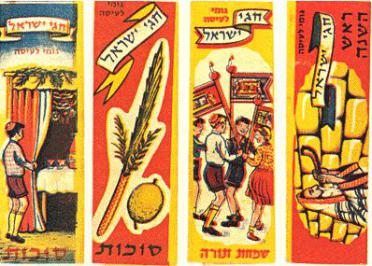Every week, parshaoftheweek.com brings you a rich selection of material on parshat hashavua, the weekly portion traditionally read in synagogues all over the world. Using both classic and contemporary material, we take a look at these portions in a fresh way, relating them to both ancient Jewish concerns as well as cutting-edge modern issues and topics. We also bring you material on the Jewish holidays, as well as insights into life cycle rituals and events...
One of the seminal, foundational texts of Rosh ha-Shanah appears in the Mishna, in the tractate called, appropriately, Rosh ha-Shanah. The Mishna tells us that on Rosh ha-Shanah all the creatures in the world pass before God to be judged like bnei maron - a difficult phrase which either means one at a time, or in single file, or like sheep before the shepherd - something which means individually, personally. The Mishna then quotes a proof text, from the Book of Psalms: "He created their hearts all together, He understands all of their actions." Now, this would seem to be an odd choice for a proof text for the fact that God judges us all on Rosh ha-Shanah. There are other verses in Psalms - for instance some of the ones we recite on Friday night as part of Kaballat Shabbat, which speak more explicitly of God as the judge of all mankind - "He arrives to judge the earth, He will judge the world justly, and the nations with His faith". In fact, in the verses which immediately precede the one which is quoted, God is clearly described as He who "looks down from heaven...beholds all the son of men" and "...looks upon all the inhabitants of the earth". Our verse does not explicitly refer to judging at all, but rather talks about the act of creation, when God, by bringing Adam into existence, created, at once, all our hearts, and, therefore, understands all our actions. Why is this verse chosen to prove that we are all judged on Rosh ha-Shanah, rather than one of the more obvious choices, which speak explicitly of God as judge?
I think the message behind this choice of proof-text is clear. The simple fact of judgment is not the point of Rosh ha-Shanah, not the lesson we need to learn from the dynamic of the day. After all, the fact that God judges is not such a big deal - we all, quite naturally and intuitively, judge. Food, TV shows, books, countries, our friends and family, people we have never met, our colleagues at school or work, we judge them all the time. To simply present God as He who judges would not really give us any new insight. We judge, He judges. We condemn whatever or whoever we dislike to eternal damnation - not that it seems to do any good - and so does He, with, I imagine, graver consequences. The lesson the Mishna does want to teach us, and which is, I think, much more interesting, is the relationship with humankind out of which stems God's ability or desire to judge us. This relationship is what we need to understand and, perhaps, emulate, if we want to correctly judge things. What is that relationship, as expressed by the proof text quoted in the Mishna?
Well, the first word is about creativity - God created us. He created, and therefore understands, our very hearts, our innermost feelings, thoughts, and desires. This would seem to indicate that God's judgment of individuals is an extension of His creating them - a further, ongoing attempt to understand, assess, and perfect that which He created. A further attempt to take responsibility for that which He created. It would seem that it is this relationship that is needed in order to really judge. A relationship of creator to created is necessary between the judge and the person, or collective, to be judged, if that judgment is to be, like God's, meaningful.
Let's use as an example a country, like Israel, or the United States. What someone sitting on the sidelines, uninvolved in any creative way with the life and development of either of these countries - not really taking responsibility for them - has to say about them, how he or she judges them, would seem to be a lot less interesting and compelling than the judgment of someone actively involved in creating these countries - in determining what they will really be like. The same would be true within a smaller community; only someone creatively and actively involved in shaping that community can see, as God does, into its heart, understand it, and, in an attempt to perfect the creation which he or she has worked on and takes responsibility for, judge it.
Certainly the same is true on an individual level. Only those with whom we have a creative, productive, caring and nourishing relationship, which is the key to our understanding them, can be seen clearly enough for us to judge them in any meaningful way - in an attempt to continue our creative interaction with them.
I wish us all on this Rosh ha-Shanah the ability to refrain from judging those individuals or collectives with whom we do not have this kind of relationship. More importantly, and more realistically (what, we are really going to stop judging people we don't even know? I don't think so), I wish all of us much success in developing the kinds of relationships where a Godly judgment is possible. Relationships in which we work to actively create, nourish, and take responsibility for the people with whom we interact, the communities of which we are members, and the nations in which we live. May we all be creators first, and only then, judges.
Shana Tova,
Rabbi Shimon Felix



Get inspired by Rosh ha-Shanah Divrei Torah from previous years